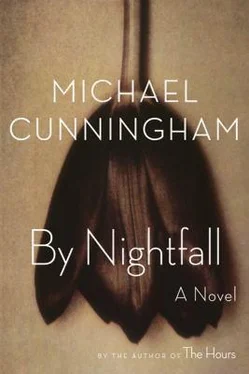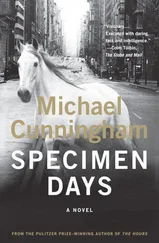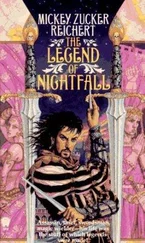No. This is my life, it’s not Death in Goddamned Venice (funny, though, that Mizzy has brought Mann along for the trip). Yes, I am an older guy who harbors a certain fascination for a much younger man, but Mizzy’s not a child like Tadzio was, and I’m not obsessed like Aschenbach (hey, didn’t I just the other day refuse to let Bobby dye my hair?).
Peter adds, lamely, “That was college, of course.”
“You’re going to tell her, aren’t you?” Mizzy says.
“Why do you think that?”
“She’s your wife.”
“Married people don’t tell each other every single thing.”
“This isn’t an ordinary thing. She’s hysterical on the subject.”
“Which is the main reason I haven’t told her yet.”
“Yet.”
“If I haven’t told her yet, it seems pretty likely that I’m probably not going to tell her at all. Why are you so het up about this?”
Mizzy emits another of those low oboe sighs, no denying that they remind Peter of Matthew.
He says, “I can’t have my family jumping all over me right now. I can’t. They think it’d be the right thing, they mean nothing but good, but really, I’m afraid it’d kill me.”
“That’s dramatic.”
A long, dark-eyed look. Practiced?
“Frankly, I’m feeling a little dramatic.”
Practiced. Absolutely. And yet, effective.
“Are you?”
Thanks, Mr. Diffident.
Mizzy cracks up. He does have this way of undercutting himself—he’s like a cartoon character who runs off a cliff and goes a half dozen strides in midair before he stops, looks down, looks back up at the audience with a mortified expression, and drops. He says something ponderous, then laughs at himself. It helps, too, that his smile is what it is, and that his laugh has that throaty, woodwind quality. Hoo-hoo-hoo-hoo-hoo, a laugh deeper than his speaking voice, richer, as if it emanated from some core of humor that was, might be, his truest nature. As if all this tortured-young-man shit is a hoax, and the actual, inner Mizzy finds the whole enterprise hilarious. As if the actual Mizzy is goat-footed, horned, playing a set of pipes.
“Yeah,” he says laughingly, which is not the answer Peter had anticipated. Peter has the good sense, for once, to keep quiet.
“I’m fucked up,” Mizzy says. He is no longer laughing, but he’s kept a rueful smile on his face that imparts a new seriousness, a veracity, to what he’s saying.
“I’m a little crazy,” he continues. “You know that. Everybody knows that. The thing is.”
He looks out the window as if searching for some anticipated landmark. He turns back to Peter again.
“The thing is, it’s getting worse. I can feel it. It got very bad in Japan. It’s like a virus. It’s not so much in my head as it is in my body, like I’ve got a fever or something, like I’ve got some kind of flu but it makes you jumpy instead of tired. And, you know. What nobody understands, what nobody who really and truly loves me understands, is that right now I know what I need better than anyone else does. It’s not like I don’t appreciate their position. My family and all. But if I let them, I’m afraid they’ll kill me. With the very very best of intentions.”
“Can I be honest with you?” Peter asks.
“By all means.”
“This sounds delusional. This sounds like an addict talking.”
Again, the low musical laugh.
“That’s what everybody but the addict thinks,” Mizzy answers. “Can I tell you something?”
“By all means.”
“Every time I’ve been doing well, I mean every time I’ve been that bright shiny guy, I’ve been doing drugs. When I was at Exeter, when I was at Yale. I’m clear and focused and compassionate and if I may say so I am fucking smart. It’s when I stop that I decide it’d be better to go dig for truffles with a bunch of potheads in Oregon.”
“What about the kind of drugs a doctor would give you?”
“I’ve tried all those. You know that, don’t you?”
“Well, yeah, sort of,” Peter answers.
“Don’t you think I wish I had a prescription for something that would make me into Good Ethan forever?”
How can he seem so persuasive, and so wrong? What should Peter say to him now?
“Do you think you’ve really tried?” is what he says.
Wrong response. He can tell by the way something recedes in Mizzy’s face—some urgent light goes dim.
“I may be fooling myself,” Mizzy says. His voice is flatter now, more ordinary. He’s gone a little businesslike. “But I really and truly believe, I feel like I know, that I’m ready to be an adult. I want a job, I want an apartment, I want a regular girlfriend. I just. I just need to get there in the way I know will work for me. If Becka and Julie and Rose start staging interventions and sign me up at some clinic, I’m sure I’ll go off again. Those clinics are horrible, by the way. Maybe there are ones for rich people that’re better, but the ones we can afford to send me to… well, you’d want to escape them, too.”
“So you believe…”
“I believe that I’m ready in a way I’ve never been before to have an actual life, and everybody just needs to let me go about it in my own way.”
Is he lying? Is he delusional? Is it possible that he’s right, and everyone else is wrong?
They disembark at Greenwich and there’s Gus the driver, an avid-eyed man around thirty, small-town guy (Peter guesses) from one of those Connecticut hamlets that supply the local gentry with, well, people like Gus. The world is full of Guses—good-looking boys and girls who’ve been dealt the best possible genetic hand by parents and grandparents and great-grandparents who have been doing neither well nor badly for generations; who engender these decent kids and give them just enough to survive in the world but no more—no spectacular beauty, no uncontainable brilliance, no kingly, unstoppable ambition.
Isn’t it the task of art to acclaim these people, to ennoble them? Consider Olympia. A girl of the streets becomes a deity.
And here, standing beside the Potters’ navy blue BMW, is Gus, scarlet-faced, jug-eared, grinning, impossible to dislike. Didn’t Carole say he was engaged to what she referred to as “a lovely local girl”? All right, it’s condescending, that inclusion of the word “local.” But at the same time it must be said that the Potters pay their staff better than custom requires, that they give them proper vacations and don’t expect them to work overhard or overlong without extra compensation. The Potters are of the “our staff is like family” school, which is grotesque in its way, but really, how can anyone have a staff and not behave at least a little grotesquely?
“Welcome, Mr. Harris,” Gus says, marching forward with a square red hand held out.
“Thanks, Gus. This is Ethan.”
Gus pumps Peter’s hand, then Mizzy’s, says, “Welcome, welcome,” pivots to open the back doors of the BMW for Peter and Mizzy. Gus the driver, about to marry a lovely local girl. Gus the driver is everywhere and yet he appears nowhere, not in portraits or photographs, not even in the stories of men like Barthelme and Carver, who were all about guys with jobs and prospects like Gus’s but who insisted on more sorrow, more angst, than Gus remotely manifests. If Gus weeps sometimes for no reason, if he stands despairing in the aisle of a Wal-Mart, it is not apparent in his daily demeanor, and Peter strongly suspects he’s just not that kind of guy, which is not to say he lacks soul or depths but that you’d have to perform major surgery to get beneath the happy chap, the good guy who likes his job just fine, likes his car and his apartment and whatever hobbies or pursuits occupy his weekends, who is already thickening, shedding without visible regret the beauty of youth (when he came to work for the Potters five years ago he was like a young farmhand) because he’s had his fun and hey, what’re you going to do, plus of course at thirty, which is by no means a desperate age, he’s about to marry a lovely local girl.
Читать дальше
Конец ознакомительного отрывка
Купить книгу












